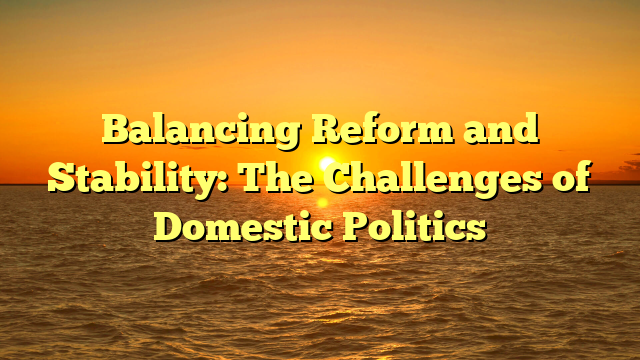Domestic politics often serves as a mirror reflecting a nation’s aspirations, struggles, and identity. In many countries, the pursuit of reform must coexist Pattimura4d with the need for stability—a delicate balance that can determine the trajectory of national development. In Indonesia, this tension is especially visible in the interplay between government initiatives, party politics, and public expectations.
One of the most significant aspects of domestic politics is the effort to strengthen democratic institutions. Since the Reformasi era began in 1998, Indonesia has made considerable progress in decentralization, media freedom, and electoral transparency. However, challenges remain, such as the influence of political dynasties, the entrenchment of patronage systems, and the persistence of corruption at various levels of government. Reform-minded policymakers face the difficult task of implementing systemic change while navigating entrenched interests.
Elections, as the primary vehicle for public participation, highlight both the strengths and weaknesses of domestic politics. On one hand, voter turnout in Indonesia remains relatively high compared to global averages, signaling strong democratic engagement. On the other hand, issues such as vote buying, identity politics, and misinformation continue to undermine electoral integrity. These problems are not unique to Indonesia, but their impact is magnified in a diverse archipelago where political alliances can shift rapidly.
Another crucial factor shaping domestic politics is the relationship between the central and regional governments. Indonesia’s decentralized governance allows local leaders to craft policies suited to their specific communities, fostering innovation in public service delivery. However, this autonomy also creates disparities in governance quality, with some regions excelling while others lag behind due to weak capacity or political instability. National leaders must therefore balance respect for local autonomy with the need for coherent national policies.
Public trust plays an equally important role. In recent years, social media has become a double-edged sword in domestic politics. While it enables greater citizen engagement and accountability, it also amplifies polarization and the spread of disinformation. Political actors have increasingly recognized the influence of digital platforms, often tailoring campaigns to online audiences. This shift has made politics more immediate and accessible, but also more volatile.
Economic policy is another arena where political decision-making is tested. The government’s approach to infrastructure development, foreign investment, and social welfare programs often sparks intense debate. Supporters argue that large-scale projects boost competitiveness and job creation, while critics warn about environmental damage, displacement of communities, and rising debt. In this environment, political leaders must craft policies that address long-term growth without sacrificing social equity.
Civil society remains a critical force in shaping domestic politics. Non-governmental organizations, activists, and grassroots movements have repeatedly pushed for reforms in environmental protection, human rights, and transparency. These groups act as watchdogs and catalysts for change, ensuring that political leaders remain accountable to the public. Yet, their effectiveness depends on maintaining independence and avoiding co-optation by political interests.
Looking ahead, the future of domestic politics in Indonesia will likely be defined by how effectively the nation can adapt to evolving challenges. Strengthening democratic norms, fostering inclusive economic growth, and bridging societal divisions are long-term goals that require sustained commitment from all stakeholders—government, political parties, civil society, and citizens alike. Achieving this will not be easy, but it is essential for ensuring that political stability and reform can coexist in a mutually reinforcing cycle.
In the end, domestic politics is not merely about competition for power—it is about shaping the rules, institutions, and culture that govern daily life. By striving for a balance between reform and stability, Indonesia has the opportunity to not only strengthen its democracy but also to serve as an example for other nations navigating similar political crossroads.
